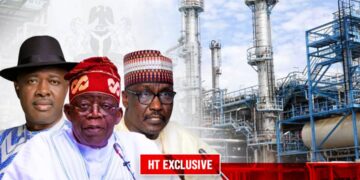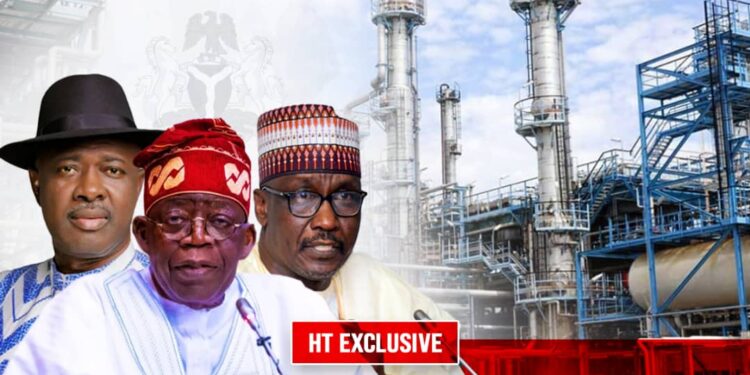By Emmanuel Nduka
The President Bola Tinubu-led cranky Federal Government of Nigeria is seeking an additional $2 billion crude oil-backed loan from international lenders to supplement the country’s finances, which have been self-strained by the president’s weak economic policies.
Confirming this on Tuesday, July 9, Mele Kyari, Group Chief Executive Officer of the Nigerian National Petroleum Corporation (NNPC), noted that the national oil company is holding talks with international lenders to raise an oil-backed credit facility.
While the NNPC assured that the credit facility will help boost the corporation’s finances and allow for investment in the oil and gas sector, the move is fresh on the heels of the recent revelation that NNPC is struggling to pay international oil traders a backlog of up to $6 billion, amid the controversial removal of fuel subsidy by President Tinubu.
Wasted Billions Of USD On Revamping Refineries
Heritage Times HT reports that the latest $2 billion credit facility will add to the oil-backed loan burden of $3.3 billion that the Nigerian Government owes the African Export and Import Bank (Afreximbank), as the Nigerian Government has now resorted to borrowing to mortgage crude oil which it is struggling to produce. Underinvestment and crude oil theft in the Niger Delta Region has dipped Nigeria’s oil output for years. Tinubu has now ensured that Nigeria is indebted by around $6 billion crude oil mortgage funds to foreign lenders.
Under the preceding President Muhammadu Buhari, Nigeria spent at least N11.35 trillion ($25 billion) on fixing the country’s three moribund refineries – Kaduna, Port Harcourt and Warri. Disclosing this in May last year, the outgoing Parliament in a report, called for a forensic audit of the matter.
The Nigerian Parliament in its report worried that despite these huge sums expunged to rehabilitate the refineries, the refineries were producing at less than 30 percent capacity. The situation has kept the country reliant on fuel imports, which it criminally subsidizes to keep prices low.
Even with the commissioning of a 650,000 barrels per day refinery owned by Africa’s richest man Aliko Dangote, hopes of transforming the country into a net exporter of petroleum products has waned.
Buhari’s Failed Promises To Revamp Refineries
Former President Buhari during his presidency, promised to revamp Nigeria’s crude oil refineries to improve their efficiency and capacity. These bloated promises according to lanky leader, were part of his broader agenda to boost the nation’s oil sector and reduce reliance on imported refined petroleum products. The key points of his promises included: Rehabilitation of state-owned refineries which had been operating below capacity for years; Increase the refining capacity to meet domestic demand and reduce the importation of refined petroleum products; Attract private sector investments and partnerships to modernize the refineries; Combating deep-rooted corruption in the oil sector; and Improve transparency and accountability within the NNPC.
However, the promises would end in gloom, as the progress in revamping the refineries remains slow and impracticable, and Nigeria has continued to face challenges in meeting its refining needs domestically.
Buhari’s Kyari, along with Timipre Sylva, Buhari’s Minister of State for Petroleum Resources dishonestly joined their principal to make commitments to revamp Nigeria’s crude oil refineries. The duo gave timelines for the completion of the rehabilitation works on the refineries which they never met. For example, the Port Harcourt refinery rehabilitation was expected to be completed in three phases, with significant progress aimed within the first couple of years (between 2015-2023). They also made an unfulfilled target to reduce Nigeria’s dependency on imported refined petroleum products.
These commitments would go down in vainness. “We are committed to ensuring that our refineries are back on stream. We are working to rehabilitate our refineries so that we can reduce the importation of petroleum products and save foreign exchange for the country,” Sylva had promised.
More Fresh, Yet Failing Promises
Heineken Lokpobiri, Tinubu’s Minister of State for Petroleum Resources (Oil), upon his appointment made fresh vows that all four state-owned refineries would become fully operational by the end of 2024. He particularly claimed that the Port Harcourt refinery would start processing oil by the end of 2023, following a $1.5 billion overhaul by Italy’s Tecnimont.
While Nigerians are currently battling severe shortage of crude oil products across the country, the Nigerian Government earlier this year declared that the Port Harcourt refinery is “mechanically” completed, with crude oil already stocked and all systems in place, pending final regulatory approvals from international bodies. But the refinery and all assurances have remained deadlocked.
More Billions Wasted In Oil Exploration The North
While analysts and industry experts are advocating that it is time for the country to look beyond oil, the Nigerian Government has spent significant national resources on expeditious crude oil exploration in northern Nigeria, particularly in the Kolmani River area, on the Upper Benue Trough, Gongola Basin, located between Bauchi and Gombe states. Despite the global shift away from fossil fuel, Nigeria has remained stuck in the oil era, relying on crude oil sales for around 90 percent of its foreign exchange earnings and more than half of government revenue.
Nigeria is the 6th largest producer of crude oil in the world, with crude oil reserves of more than 37 billion barrels. The oil wells — OPLs 809 and 810 — discovered in the north, is to be developed by Sterling Global Oil in partnership with the NNPC, as launched by President Muhammadu Buhari on November 22, 2022.
The discovery of oil in “commercial quantity” in the North came 62 years after the famous oil and gas discovery and drilling took place in Oloibiri, Bayelsa State, South-South, Nigeria. The fanfare in the North was spectacular and exaggerated. At last, the North was satisfied that it could become what the Niger Delta Region is to the Nigerian economy.
Heritage Times HT reports that after over 30 years of the elusive search for hydrocarbons in the Lake Chad Basin where the Nigerian Government spent about N149.4 billion in the failed expedition looking for oil, another shot is being given. The stated amount is exclusive of the $340 million, and an additional N27 billion committed by the Nigerian Government in the misadventure.
The project, known as the Kolmani Integrated Development Project, has already attracted over $3 billion in foreign direct investment and aims to produce about 50,000 barrels of crude oil per day, former President Buhari claimed. The Nigerian Government is mulishly dragging on with this project, despite warnings by industry experts and geologists who insist that the geography of the zone may not guarantee a commercial discovery.
The discovery and drilling of crude oil in Bauchi and Gombe axis is the first in the 19 northern states where millions of dollars had been wasted by the NNPC looking for oil.
Government Should Turn To Innovative Industry Experts
Can the Nigerian Government admit that it is dazed and seek professional assistance from innovative experts in the industry? This is the global practice, as industry experts boast of innovative talents needed to foster sustainable growth of the sector.
There appears to be no hope in sight. The Tinubu Government set up a Committee to oversee the rehabilitation of the country’s refineries. Sadly, the Committee has a long list of key figures, including Kyari, who himself had superintended past failed promises under previous administration.
As Watchdog of society, Heritage Times HT has committed to monitor emerging production commitments of the committee to the latter, with an unalloyed responsibility to feed our African and global audience with the happenings.



































